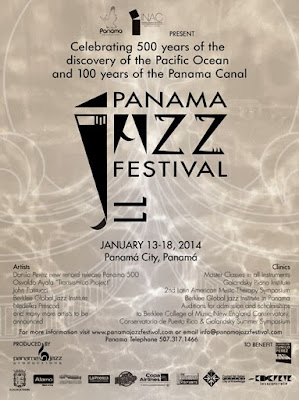In 1513, Spanish explorer Vasco Núñez de Balboa crossed the Isthmus of Panama, becoming the first European to reach the Pacific Ocean and founding the first permanent European settlement in the Americas. Those events continue to resonate five centuries later as Panama celebrates the landmark anniversary. On his new Mack Avenue recording, Panama 500 (set for release on February 4), favorite son Danilo Pérez adds his voice to the tributes with a portrait of his native land, its storied history, rich culture and fierce struggles.
Pérez’s blend of influences makes him the ideal musical chronicler of his country’s history. Already a land bridge between the Americas with a vibrant indigenous culture, Panama also began to absorb European culture into its own following Balboa’s arrival. Pérez similarly weaves together jazz and Pan-American folkloric traditions with influences from European classical music.
“I have been working for years to make music that has an identity very similar to the role that Panama plays in the world,” Pérez says. “It’s a place where a lot of influences from all over the world come together.”
Pérez refers to Balboa’s arrival as a “rediscovery,” a word that succinctly encapsulates both the importance of his accomplishment and the controversy inherent in European colonization. As he traces Panama’s evolution over the 12 tracks on Panama 500, he gives literal voice to the indigenous Guna Indians of Panama, who provide intermittent narration to lend their own perspective on that history.
As Harvard professor Davíd Carrasco writes in his liner notes, “The magical performances in this album emerge from the encounters of indigenous shamans, Spanish migrants of desire, the human agony of African slaves, multicultural love, and transcendent improvisations on agony and love.”
To realize his expansive vision for this music, Pérez pulled together a host of musicians from his various endeavors. The album features both of his longest-running rhythm sections-trio mates Ben Street and Adam Cruz; as well as bassist John Patitucci and drummer Brian Blade, with whom Pérez works in the acclaimed Wayne Shorter Quartet. “There’s a specific spectrum of language that I’ve developed with both trios,” Pérez says. “With Ben and Adam, we use Latin American vocabularies to connect closer with jazz and to expand on the idea of clave. And with John and Brian, it’s that language that we’ve developed playing with Wayne over the years that is indescribable. There’s a zero-gravity component to it, where things come out of nowhere.”
 The rhythmic density is compounded throughout Panama 500 by percussionists from three different countries: Roman Díaz from Cuba, Rogério Boccato from Brazil; and Milagros Blades and Ricaurte Villarreal from Panama. The classical influence, as well as evidence of Pérez’ commitment to education, arrives in the form of violinist Alex Hargreaves, a former student of the Berklee Global Jazz Institute, the globally-minded program for which Pérez serves as artistic director.Pérez explains that he composed the music for Panama 500 almost as the score for an imaginary film about the country’s past and present. “More than focusing on rediscovery we should focus on celebrating our histories, our stories, our music, our culture,” he says. “My vision is to create music that serves as a cultural passport, hopefully with Panama as the bridge of the world.”
The rhythmic density is compounded throughout Panama 500 by percussionists from three different countries: Roman Díaz from Cuba, Rogério Boccato from Brazil; and Milagros Blades and Ricaurte Villarreal from Panama. The classical influence, as well as evidence of Pérez’ commitment to education, arrives in the form of violinist Alex Hargreaves, a former student of the Berklee Global Jazz Institute, the globally-minded program for which Pérez serves as artistic director.Pérez explains that he composed the music for Panama 500 almost as the score for an imaginary film about the country’s past and present. “More than focusing on rediscovery we should focus on celebrating our histories, our stories, our music, our culture,” he says. “My vision is to create music that serves as a cultural passport, hopefully with Panama as the bridge of the world.”¡¡Viva The Latin Jazz!!


No hay comentarios:
Publicar un comentario